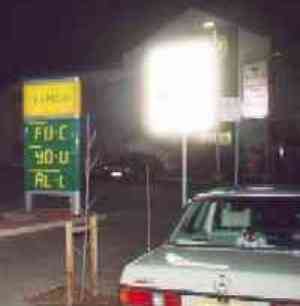That Petrol Emotion
My, what an interesting week. For a while there, I felt like I was inhabiting a 70’s TV series (remember Survivors?), with the entire fabric of the country about to collapse into anarchy and chaos. No such luck, however, even if the petrol companies obviously were not trying too hard to get the tankers out the gates.

I can see their point, even if the (hastily changed) decision to increase the price the same day the blockades finished must go down as one of the stupidest in the history of capitalism. They do all the hard work, take the risks and make a couple of pence profit. The government comes along, in its wide-brimmed hat and platform soles, smacks them around a bit and rakes in 60 pence on every litre. That’s the kind of mark-up any pimp would be proud of. They bleat about how it’s an “environment tax”, to dissuade people from using their cars but, to extend the metaphor, would you give credence to a drug lord justifying who jacks up the price of heroin and says it’s for your own good? You need to stop people wanting to use their cars, by removing the need (how many mega-malls have the government allowed to be built outside of towns?), and giving them alternatives, in the shape of a good public transport network. I don’t have a car – haven’t had one for five years or so – because it’s simply not necessary in London. But if I still lived in Forres, it would be a necessity.
It was almost inevitable that sooner or later, people would say “enough’s enough”. Seeing the French complain, at lower tax rates didn’t help, and nor did the general perception that huge piles of public money are being poured down the drain in Greenwich. If we’ve got so much cash to throw around, why are we taxed so heavily? Fair question. It’s been seen by successive governments as an easy cash-cow to milk, with each Chancellor squeezing the udders ever tighter, each budget jacking up the price a bit more. But unlike booze and fags, fuel is now – as we’ve seen – essential to everyday life. [Booze is merely essential to get you through everyday life…] It’s hard to see why petrol should be so heavily taxed when, for example, electricity isn’t.
What was startling was how few people it took to bring everything to a grinding halt, and the speed at which the crisis exploded was also very encouraging to any would-be revolutionaries. The modern approach of minimising stocks may be efficient, but if the chain of supply breaks down, for whatever reason, you’re stuffed. When Thatcher took on the miners, in the last comparable action, she prepared by making sure coal stocks were built up in advance. With no such chance this time, the crisis rapidly exploded from nothing. And so much for the Blitz spirit — fist-fights on forecourts, panic-buying in supermarkets, the works. Hell, I even went to the bother of killing my neighbours and salting their corpses in the cellar for emergency consumption. I’ll miss them…
I find Blair’s refusal to bow to the protestors also very interesting, given his government’s willingess to accede to the demands of the far more violent anti-hunt lobby. I always thought democracy was about the government doing what the people wanted. Silly me. I’ll end with a quote: “This country, with its institutions, belongs to the people who inhabit it. Whenever they shall grow weary of the existing government, they can exercise their constitutional right of amending it, or their revolutionary right to dismember or overthrow it.” Which radical expressed such anarchic views? Karl Marx? Che Guevera? Mao Tse-Tung? Nope. Abraham Lincoln, in his 1861 inaugural address. Somehow, I feel politics, and politicians, have changed in the 140 years since, and not for the better.